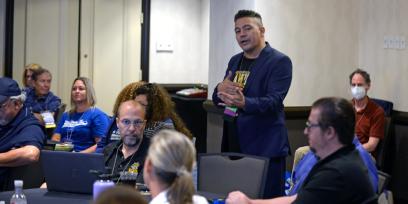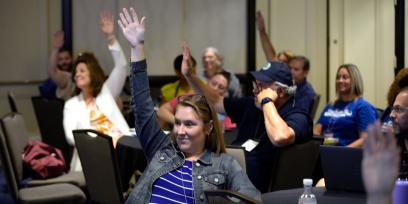A workshop at the AFT’s TEACH conference titled “Take Back Your Profession: Elevating Educator Voice in Education Policy” gave an energetic group of educators a road map to champion honest education. The workshop was led by Gerardo Muñoz, the 2021 Colorado Teacher of the Year, and Takeru “TK” Nagayoshi, the 2020 Massachusetts Teacher of the Year. This event ignited a fire within educators to stand up and speak out for the students they serve.
The workshop centered on the importance of standing up for student-centered teaching and learning, an approach that honors the unique identities and diverse backgrounds of every learner, in a time when such education is under attack. The effort to defend an honest education is the result of a shared sense of duty to preserve the rights of all students, especially those disproportionately impacted by divisive concepts bans. Extremist politicians’ constant efforts to undermine education include attempts to silence teachers and stifle discussions in the classroom. In the last three years, more than 700 anti-honest education bills, resolutions, executive orders and other measures that harm students have been introduced by hundreds of local, state and federal entities.
The speakers used this fact to rally educators, encouraging them to wield their influence to protect their students’ rights and shape the future of education. “The goal of this session is to empower each and every one of you to feel like you can actually do something about the harmful things done at a policy and legislative level,” said Nagayoshi. “We want everybody to have a way to address those things that you could do, as soon as you’re back in front of kids and back in your school.”
The session became a melting pot of ideas, where educators collaborated to develop strategies to confront harmful policies head-on. The presenters wanted the participants to see themselves as teacher advocates, uniquely qualified to speak up on legislation and policy issues that affect the classroom.
Unfortunately, many of the participants said that they felt like they are under a microscope or have to walk on eggshells in the classroom. “We’re so burdened by this fearmongering that’s taking place that when it comes to actually getting through to our students, it’s harder for us to teach,” said Nagayoshi. He noted that the anti-honest education talking points from extremist Republicans were created in think tanks funded by billionaires who have a vested interest in dismantling education, particularly public education. “It’s a coordinated effort. So when we say ‘take back your profession,’ it means recognizing that this is the disinformation reality that we’re navigating and we have to come together to combat against,” said Nagayoshi.
The good news is that these anti-honest education stances are incredibly unpopular, said the presenters. Most polls indicate that the public does not agree with anti-honest education efforts. In fact, because educators are revered as trusted sources within their communities, the weight of their voices and their credibility is a key factor in countering the opposition’s fearmongering.
The participants enthusiastically absorbed actionable strategies to advocate for honest education. From testifying at school board meetings to writing influential op-eds and supporting curricula that affirm students, attendees discovered powerful tools to effect change.
The presenters left the attendees with a resounding message: Educators deserve a seat at the decision-making table.
[Adrienne Coles]


